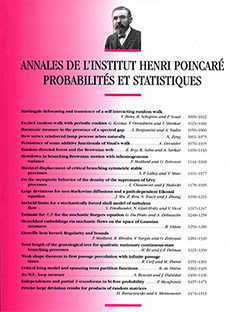Abstract
In a convolution model, we observe random variables whose distribution is the convolution of some unknown density f and some known noise density g. We assume that g is polynomially smooth. We provide goodness-of-fit testing procedures for the test H0: f=f0, where the alternative H1 is expressed with respect to $\mathbb{L}_{2}$-norm (i.e. has the form $\psi_{n}^{-2}\|f-f_{0}\|_{2}^{2}\ge \mathcal{C}$). Our procedure is adaptive with respect to the unknown smoothness parameter τ of f. Different testing rates (ψn) are obtained according to whether f0 is polynomially or exponentially smooth. A price for adaptation is noted and for computing this, we provide a non-uniform Berry–Esseen type theorem for degenerate U-statistics. In the case of polynomially smooth f0, we prove that the price for adaptation is optimal. We emphasise the fact that the alternative may contain functions smoother than the null density to be tested, which is new in the context of goodness-of-fit tests.
Dans un modèle de convolution, les observations sont des variables aléatoires réelles dont la distribution est la convoluée entre une densité inconnue f et une densité de bruit g supposée entièrement connue. Nous supposons que g est de régularité polynomiale. Nous proposons un test d’adéquation de l’hypothèse H0: f=f0 lorsque l’alternative H1 est exprimée à partir de la norme $\mathbb{L}_{2}$ (i.e. de la forme $\psi_{n}^{-2}\|f-f_{0}\|_{2}^{2}\ge\mathcal{C}$). Cette procédure est adaptative par rapport au paramètre inconnu τ qui décrit la régularité de f. Nous obtenons différentes vitesses de test (ψn) en fonction du type de régularité de f0 (polynomiale ou bien exponentielle). L’adaptativité induit une perte sur la vitesse de test, perte qui est calculée grâce à un théorème de type Berry–Esseen non-uniforme pour des U-statistiques dégénérées. Dans le cas d’une régularité polynomiale pour f0, nous prouvons que cette perte est optimale. Soulignons que l’alternative peut éventuellement inclure des densités qui sont plus régulières que la densité à tester sous l’hypothèse nulle, ce qui est un point de vue nouveau pour les tests d’adaptation.
Citation
Cristina Butucea. Catherine Matias. Christophe Pouet. "Adaptive goodness-of-fit testing from indirect observations." Ann. Inst. H. Poincaré Probab. Statist. 45 (2) 352 - 372, May 2009. https://doi.org/10.1214/08-AIHP166
Information





